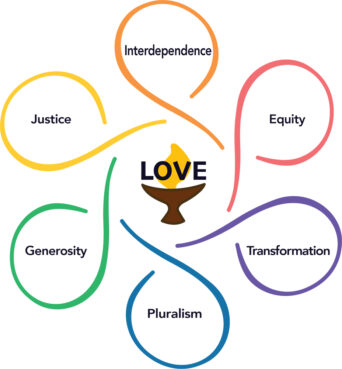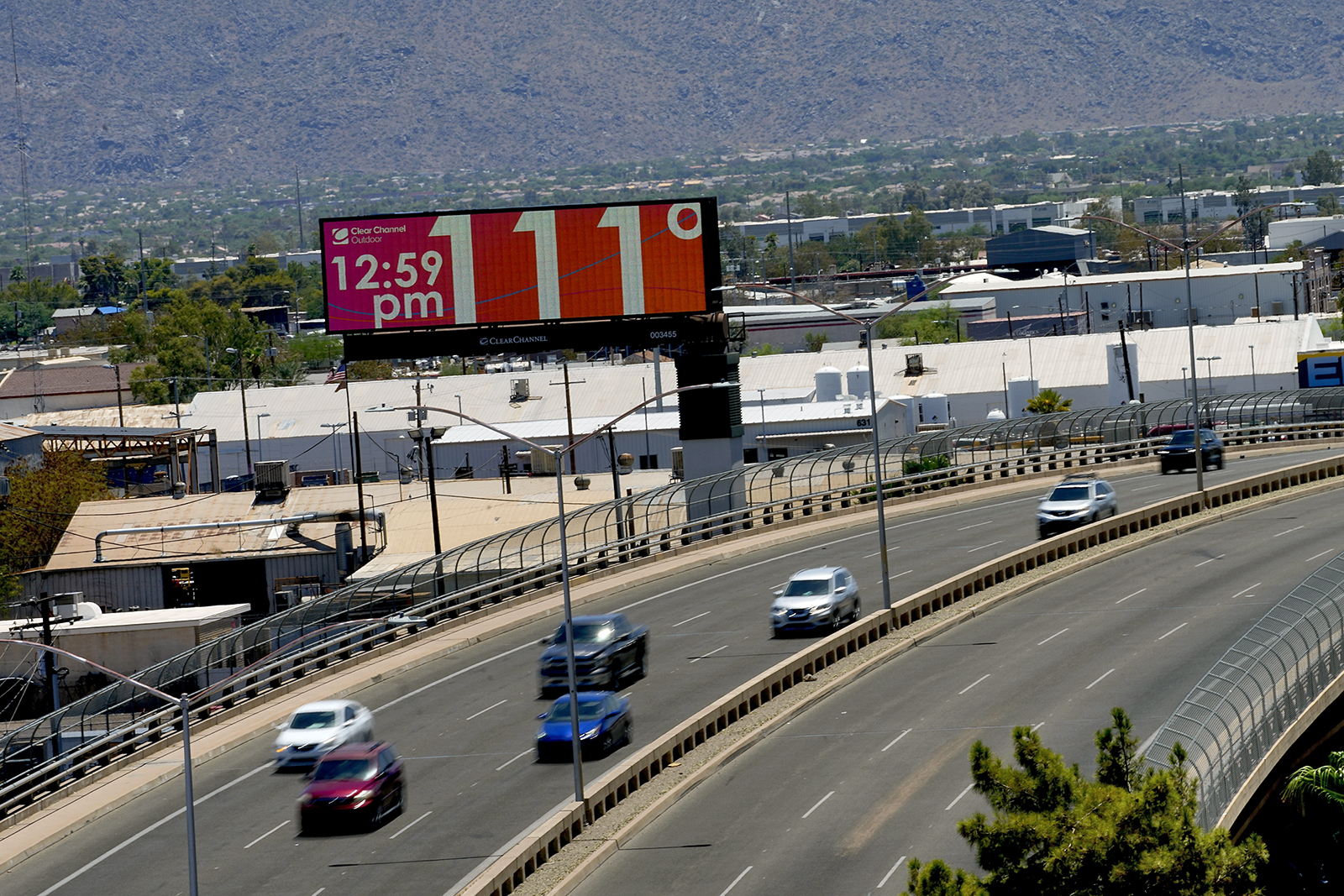(RNS) — At their annual General Assembly, Unitarian Universalists voted for a new statement of values and affirmed their commitment to issues around climate change; to the inclusion of transgender, nonbinary and intersex people; to addressing the affects of COVID-19; and to solidarity with Palestinians, as well as Israeli hostages.
The new statement of values, which passed with 80% support, is the first wholesale revision of Article II, the Unitarian Universalist covenant clause, since 1987 and reflects over three years of feedback and discussions with thousands of Unitarian Universalists.
The new version of Article II contains seven interconnected values: equity, generosity, interdependence, justice, pluralism and transformation, which all surround love in a “shared values flower.” Each value is accompanied by multiple sentences that describe how Unitarian Universalists intend to uphold their covenant, replacing a previous set of principles that were simply nouns.
While the revision passed with a high level of support, some UU groups had organized against the new statement of values, raising concerns about a diminished emphasis on values of individualism, free speech and personal freedom, as well as an overemphasis on combating white supremacy and a preferential listening process for certain marginalized groups.

The Article II Shared Values Flower. (Image by Tanya Webster)
The new version of Article II does not mention white supremacy, although it does have a sentence that says, “We covenant to dismantle racism and all forms of systemic oppression.” The revised Article II also includes a section on freedom of belief.
“This is a historic moment for Unitarian Universalism, as we move our living tradition forward to focus on shared values that will help promote liberation, radical inclusion, and communal care both within our church and across society,” said the Rev. Sofía Betancourt, president of the Unitarian Universalist Association, in a statement.
Of the process for arriving at the changes, Betancourt said, “Everyone who wanted to be involved had the opportunity to provide input and make their case. This language of shared values is all the stronger and more reflective of who Unitarian Universalists are today because it was a shared process.”
The denomination also passed several “actions of immediate witness” to respond to current events. Three-quarters of the general assembly (74%) approved a commitment of solidarity with Palestinians, which included calls for “an immediate permanent ceasefire, massive humanitarian aid, the release of all captives, and an end to genocide around the world,” as well as support for boycott, divestment and sanctions actions against Israel and “corporate enablers.”
According to a press release by the Unitarian Universalists supporting the pro-Palestinian resolution, the action of immediate witness represented the first time that the general assembly voted to support ending U.S. military support for Israel and raised concerns about Zionism.
“Many UU Jews, like myself, have been out on the streets for months, demanding ‘Never Again for Anyone,’” wrote the Rev. DL Helfer, the primary proposer of the resolution, in the press release.
Helfer continued, “For far too long, Unitarian Universalism has failed to demonstrate solidarity with the Palestinian and more broadly, Arab, people. This (action of immediate witness) does not in itself heal these ills, but starts us on a path to do so. May our love lead us there.”
More than 37,000 people have been killed and more than 86,000 injured in Gaza, according to health officials there, since Israel began a military campaign in Gaza after the Oct. 7 Hamas attack on Israel, which left an estimated 1,200 people dead and more than 200 taken captive.
The Rev. Joseph Santos-Lyons, a community minister for the Unitarian Universalist people of color and antiracist ministry DRUUMM, who was also supporting the Palestinian solidarity resolution, wrote, “We are heartbroken and outraged at the unending violence, and horrified by our US tax dollars being used to perpetuate widespread killing of Palestinians, humanitarian workers, journalists, and the destruction of schools, hospitals, religious, and cultural centers in Gaza.”
While the Palestinian solidarity resolution decried “all the violence of October 7,” a brief responsive resolution was also introduced at the general assembly calling for “the immediate release of all Hamas held hostages,” which passed with 77% support.
Although the two statements related to Palestine and Israel easily cleared the two-thirds requirement for passage, both received lower levels of support compared to other resolutions and statements that were even more popular than the changes to Article II.
Ninety-six percent of the general assembly approved a resolution calling on President Joe Biden to recognize that climate change is causing a public health emergency by invoking “the Stafford Act and the National Emergencies Act.”

A digital billboard displays an unofficial temperature, July 17, 2023, in downtown Phoenix. (AP Photo/Matt York, File)
The action of immediate witness recognizes many interconnected issues and also advocates for listening to marginalized people about their needs, and for emergency heat services, housing assistance, support for labor unions and non-discrimination laws for LGBTQ+ people.
“Organized religion can be helpful before, during, and after community disasters,” the Unitarian Universalist action of immediate witness wrote.
A separate business resolution, passing with 92% support, focused on transgender, nonbinary and intersex people and commits Unitarian Universalists to work against anti-transgender legislation, support community organizations advocating for those groups — including for health care — and create welcoming spaces within their own congregations.
“Being transgender or identifying with any gender other than the one assigned at birth, is a beautiful and divine manifestation of humanity; as is being intersex, or having sex characteristics that vary from what is considered typical,” the resolution said.
Another action of immediate witness focused on “centering love amidst the ongoing impact of COVID-19,” writing that “the current U.S. governmental approach to COVID-19 management still jeopardizes the lives of higher-risk individuals and leaves many unknowingly susceptible to the potential long-term impacts of COVID-19 infections.”
The resolution, which passed with 86% support, calls for congregational action to continue community care around COVID-19, including supporting a culture where members feel comfortable masking, upgrading air ventilation and filtration and preventing acutely ill people from attending in-person events.
At the level of the Unitarian Universalist Association, the resolution commits the national organization to supporting local congregations with their work and advancing advocacy work around issues like mask bans, vaccines and treatment, data-collection practices, ventilation and funding for long-COVID research and care.
“Our faith proclamations of love and justice call us to confront the ongoing disregard for those most vulnerable in our world and meet it with liberating counter-cultural norms in our communities,” the resolution says.















